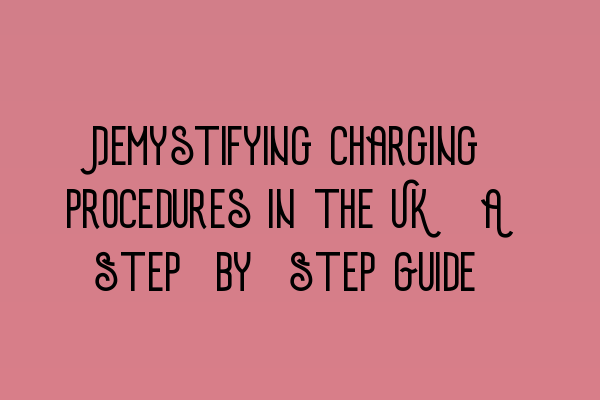Demystifying Charging Procedures in the UK: A Step-by-Step Guide
Understanding the charging procedures in the UK criminal justice system is crucial for both defendants and their legal representatives. The process to determine whether to charge an individual with an offence involves several key steps. In this comprehensive guide, we will walk you through each stage of the charging procedure, helping you gain a clear understanding of this intricate process.
Step 1: The Investigation Phase
Any criminal case begins with an investigation led by law enforcement agencies, such as the police. During this phase, the police collect evidence, interview witnesses, and gather all relevant information related to the alleged offence. It is essential for the defence team to stay informed and involved in this process to ensure a fair and impartial investigation. If you require assistance with the investigatory phase, our SQE 1 Preparation Courses can provide you with the necessary knowledge and skills.
Step 2: Arrest and Detention
If the police have sufficient evidence to suspect someone of committing a crime, they may arrest and detain that individual. While the police have the power to arrest without a warrant in certain circumstances, the decision to detain someone should always be based on reasonable grounds and proportionate to the alleged offence. Understanding the rights of the accused during arrest and detention is crucial. Our expert solicitors at SQE Criminal Law & Practice Law UK can provide you with professional guidance throughout this process.
Step 3: Police Bail or Release Under Investigation
After arrest and detention, the police must decide whether to release the individual on bail or release them under investigation. Bail allows the accused to be released from custody under specific conditions, such as periodic reporting to the police station. Release under investigation means the individual is not subject to any formal bail conditions but is still under investigation. It is important to be aware of the implications of each option and seek legal advice accordingly.
Step 4: Submission to the Crown Prosecution Service (CPS)
Once the police have completed their investigation, they will submit the case to the Crown Prosecution Service (CPS) for review. The CPS is responsible for determining whether there is sufficient evidence to proceed with the prosecution. They assess the case against the Code for Crown Prosecutors, which sets out the evidential and public interest tests. If you require assistance in preparing your defence against the CPS, our SQE 2 Preparation Courses can help you develop the necessary skills.
Step 5: Charging Decision
Based on the evidence and the CPS’s assessment, a charging decision will be made. The CPS may decide to charge the defendant with one or more offences. If the CPS believes that there is insufficient evidence or that it is not in the public interest to proceed, they may choose not to charge the individual. It is crucial to understand and evaluate the charging decision carefully, as it forms the basis of the subsequent legal proceedings.
Step 6: First Appearance in Court
Once charged, the accused is required to appear in court for their first hearing, known as the first appearance. During this hearing, the charges are read out, and the defendant is asked to enter a plea. It is advisable to seek legal representation at this stage to ensure your rights are protected and to navigate through the complexities of the courtroom effectively.
Step 7: Pre-trial Proceedings
After the initial appearance in court, there are several pre-trial proceedings that take place, including case management hearings and disclosure of evidence. These proceedings are critical in preparing your defence strategy and understanding the strengths and weaknesses of the prosecution’s case. Our expert solicitors at SQE Criminal Law & Practice Law UK can guide you through these proceedings and help you build a robust defence.
Step 8: Trial
If the case proceeds to trial, the accused will have the opportunity to present their case, challenge the prosecution’s evidence, and cross-examine witnesses. It is crucial to have a strong legal team by your side to ensure you receive a fair trial. Our experienced solicitors at SQE Criminal Law & Practice Law UK have a track record of success in defending clients in criminal trials.
Conclusion
Understanding the step-by-step guide to charging procedures in the UK is crucial for individuals involved in criminal cases. This comprehensive guide has provided an overview of the process, from the investigation phase to the trial stage. If you require professional assistance, our team of expert solicitors at SQE Criminal Law & Practice Law UK is here to help.
For additional guidance and resources, we recommend exploring the following related articles:
- SQE 1 Practice Exam Questions
- SQE 1 Practice Mocks FLK1 FLK2
- SQE 2 Preparation Courses
- SQE 1 Preparation Courses
- SRA SQE Exam Dates
